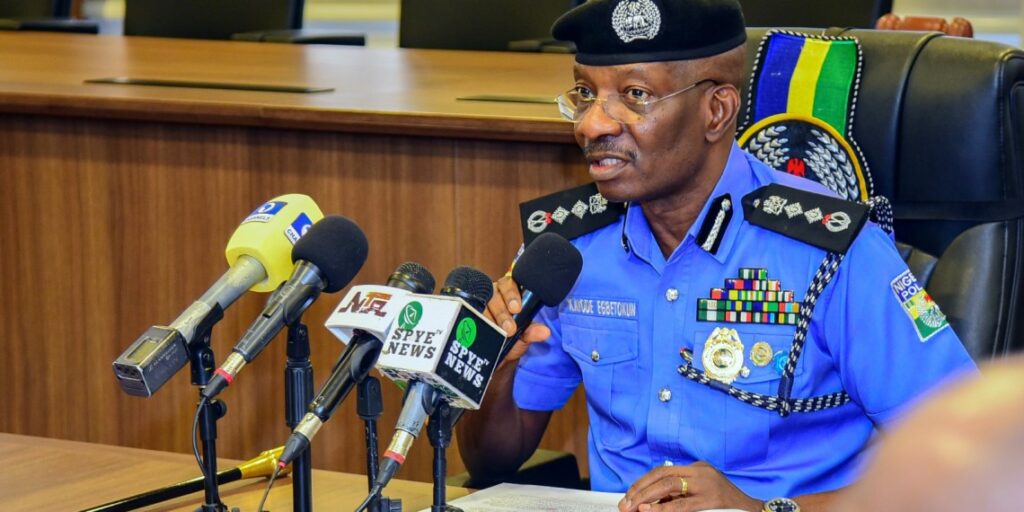
Abuja – Nigeria’s Inspector General of Police, Kayode Egbetokun, on Friday, said that intelligence at the disposal of the Nigeria Police Force has revealed that foreign mercenaries are involved in the planned nationwide protest.
Addressing journalists in the country’s capital, Abuja, Egbetokun urged all Nigerians to exercise caution and think twice before joining any protest group.
Egbetokun said: “We have been monitoring development surrounding protest threats. While some groups call for violent protests, emulating Kenya’s recent events, others advocate for peaceful demonstrations.
“However, some individuals promote peaceful protests with violent undertones, raising concerns about their sincerity. We have our history of violent protests in Nigeria, and I don’t believe we have to look to other countries to note the dangers of unchecked demonstrations. We commend patriots who have withdrawn from the protest due to the apparent sinister motives and ignorance of those calling for violence.
“We note those who have spoken out against any form of protest at this critical juncture, fearing enemies of our country may be manipulating the process. We confirm their fears are genuine, as we have credible intelligence on foreign mercenaries’ involvement in this planned protest. The Nigerian police urge all Nigerians to exercise caution and think twice before joining any protest group.”
Egbetokun also urged all groups planning to participate in the proposed nationwide protest to submit their details to the Commissioners of Police in their respective states.
The police chief said this was to ensure the protest was peaceful.
“We acknowledge the constitutional right of Nigerian citizens to peaceful assembly and protest,” he said.
“However, in the interest of public safety and order, we urge all groups planning to protest to provide necessary details to the Commissioner of Police in the state where the protest is intended to take place.
“To facilitate a successful and incident-free protest, they should please provide the following information: state the proposed protest routes and assembly points; expected duration of the protest; and names and contact details of protest leaders and organisers.”
Egbetokun said that the information expected from the organisers also include measures to prevent hijacking by criminal elements, as well as key identifiers for possible isolation of potential troublemakers.
He added that by providing the information, the police will be able to deploy adequate personnel and resources to ensure public safety.
The police chief also said the police needed to know the specific routes and areas for the protest to avoid conflicts with other events or activities.
Other guidelines, as issued by Egbetokun, are: “Establish clear communication channels with protest leaders to address any concerns or issues that may arise; minimise the risk of violence, property damage, or other criminal activity.
“We encourage all protesters to cooperate with the police, obey the law, and adhere to global best practices for peaceful assembly to guarantee a safe and successful exercise of their rights.”
Egbetokun’s press briefing comes after a leaked memo revealed that the police chief ordered police operatives to work with the military and other sister agencies to stop the protest from happening.
The leaked memo, first sighted by Sahara Reporters, noted that the directive came from the Inspector General of Police through the Department of Operations in Abuja.
It said that information received “reveals that some unidentified groups are mobilising for mass protest nationwide from 1st to 10th August 2024, find attached handbill for details of their movement.
“The INGENPOL (inspector general of police) directs that you be proactive X mobilise well kitted and equipped personnel yours X synergies with other sister agencies and the military X take over all strategic points in your AOR (Areas of Responsibility) x deploy undercover for intelligence gathering x disperse unlawful gathering x be in heart-to-heart conversation with community stakeholders x no form of protest must be allowed during the period.”
Nigeria is facing its worst economic crisis in decades, with skyrocketing inflation, a national currency in free-fall and millions of people struggling to buy food. Only two years ago Africa’s biggest economy, Nigeria is projected to drop to fourth place this year.
The pain is widespread. Unions strike to protest salaries of around $20 a month. People die in stampedes, desperate for free sacks of rice. Hospitals are overrun with women wracked by spasms from calcium deficiencies.
The crisis is largely believed to be rooted in two major changes implemented by a president elected 14 months ago: the partial removal of fuel subsidies and the floating of the currency, which together have caused major price rises.
A nation of entrepreneurs, Nigeria’s more than 200 million citizens are skilled at managing in tough circumstances, without the services states usually provide. They generate their own electricity and source their own water. They take up arms and defend their communities when the armed forces cannot. They negotiate with armed kidnappers when family members are abducted.
But right now, their resourcefulness is being stretched to the limit.
Some folks are planning protests to voice their concerns about the economic situation, including rising inflation and poverty, under President Tinubu’s administration.
The protests are expected to happen in the north and other parts of the country, but residents and leaders of the south-eastern region, inhabited by the Igbo ethnic group – have made it clear that they are not going to be part of the mass action.
KOIKI Media bringing the world 🌎 closer to your door step
